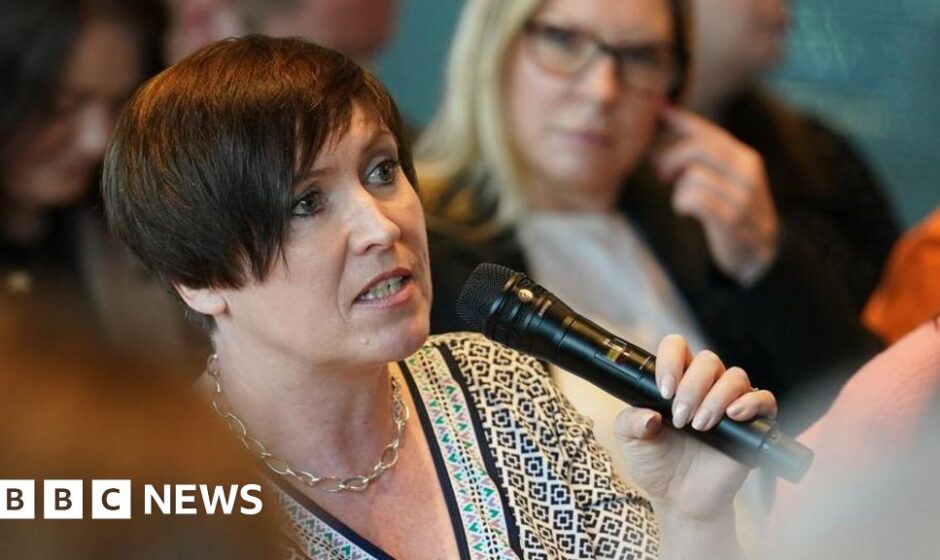 PA Media
PA MediaThe UK Supreme Court’s ruling that sex is defined by biology is “hugely problematic”, a Scottish union leader has said.
It comes after the Equalities and Human Rights Commission (EHRC) issued interim advice on how the ruling should be implemented when it comes to single-sex spaces.
The guidance says “trans women (biological men) should not be permitted to use women’s facilities” in places like hospitals, shops and restaurants – but they should not be left with no facilities to use.
But Roz Foyer, general secretary of the Scottish Trades Union Congress, said she did not agree with the Supreme Court’s ruling, and questioned which facilities trans people should use.
Speaking to BBC Radio Scotland’s Sunday Show, Ms Foyer said: “We have a ruling here that’s basically saying trans women can no longer use female-only facilities.
“Does that mean trans men can no longer use male-only facilities? Will they be forced to use female facilities? Will trans women be forced to use men’s facilities?”
She said all parties had to feel protected and the recent legal rulings would “cause huge problems”.
Supreme Court ruling ‘extremely problematic’
Asked if she agreed with the court’s ruling, she said: “No, I don’t agree with it and I think it is extremely problematic.”
Ms Foyer added: “Women need protected in society from male violence – but the male violence that most women experience happens in their homes and workplaces and communities, and it usually is from men they know.”
She added: “We are going to have to make sure we protect all parties’ rights, but we actually have to find a way forward that makes sure we have some sort of provision for trans men and women in our public bodies, in our institutions.
“Obviously they are going to have to follow and respect the law, but I think this debate will rattle on, I am not sure the law has got it right.”
UK government minister Pat McFadden was asked by the BBC if his government – when acting as an employer – would stop trans people from using certain changing rooms or bathrooms.
He said yes, that was the “logical consequence of the judgement and the guidance that’s come out, that people use the facilities of their biological sex”.
However, he added that there would not be “toilet police” in government buildings.
EHRC to issue further guidance
A spokeswoman for the business lobby group the CBI said the ruling did not change the fact that all employers should strive to provide an inclusive workplace while complying with the law.
She added: “We know businesses thrive with a diverse workforce, and they should continue to provide a welcoming environment for all while making legally compliant decisions.
“There will be a new statutory code on the implementation of the Equality Act issued later in the summer by the Equality and Human Rights Commission which will provide additional clarity for firms and organisations across the UK.”
The Scottish government said it was seeking a meeting with the EHRC to make sure inclusive and consistent guidance was in place.
A government spokesperson said: “We note the interim update from the EHRC, and that they intend to hold a consultation with stakeholders on their forthcoming guidance.
“We are keen to work with EHRC to ensure consistent, inclusive and comprehensive guidance is in place following the Supreme Court judgement and, following the postponement of last week’s meeting at their request, have asked to meet with them as soon as possible to discuss further.”
Tess White, Scottish Conservative equalities spokeswoman, welcomed the new guidance as “much needed clarity”.
She said: “The EHRC sets out the practical delivery of single-sex spaces, following the Supreme Court’s judgement, which will protect women and girls.
“It also sets out how shared spaces can be provided for people who identify as trans.”
 PA Media
PA MediaNew laws were proposed under former First Minister Nicola Sturgeon in 2022 which would make it easier for trans people to change their legally recognised sex.
MSPs voted to pass gender recognition reforms but this was later blocked by UK ministers, who said it would conflict with equality protections which applied across the UK.
Sturgeon has described herself as “a lifelong feminist” but also said it was “really important” to protect and enhance the rights of trans people, insisting that trans rights and women’s rights do not need to clash.
The Mail on Sunday asked Sturgeon for her reaction to the Supreme Court ruling at a constituency event on Saturday.
She told the paper: “I think my views are well-known.”
When she was pushed further on what those views were, she said: “I think you know.”
#Singlesex #spaces #advice #problematic #STUCs #Roz #Foyer



